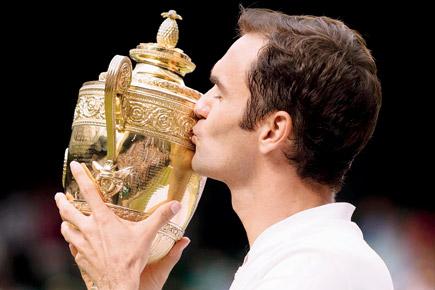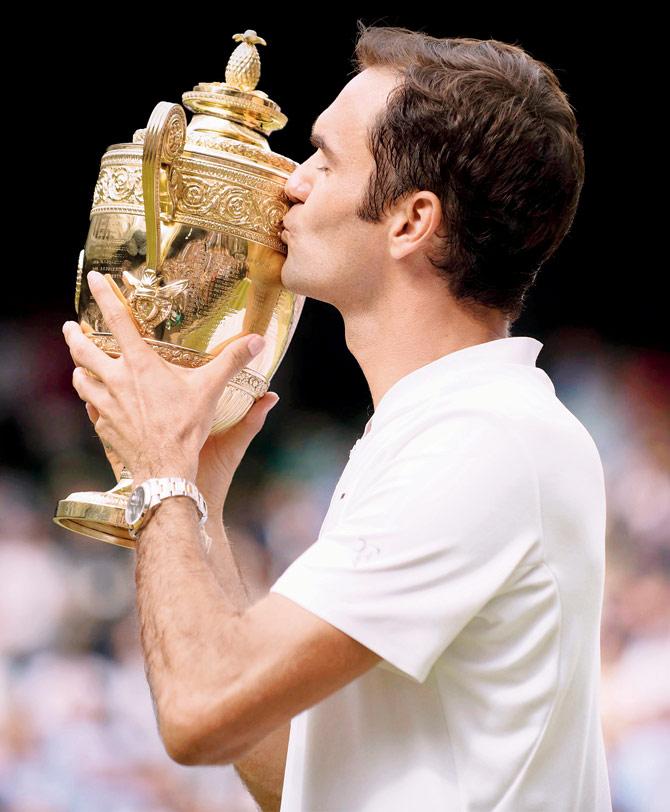Winning Wimbledon at 35 without dropping a set is incredible. All this, while playing with a head cold! I can't even serve myself a cup of tea with a head cold, let alone hit a tennis serve!

Roger Federer kisses the Wimbledon trophy after winning the men's singles title in London on Sunday. Pic/Getty Images

Roger Federer kisses the Wimbledon trophy after winning the men's singles title in London on Sunday. Pic/Getty Images
ADVERTISEMENT
Like every year, Wimbledon 2017 had many plots and sub-plots to it that kept fans across the world glued to arguably the most important sporting event of the year.
Venus Williams' stirring run to the final, England and their fascination for the Murray brothers and now, Johanna Konta, the fashion police checking the underwear of some junior players, an unusually long list of injury-hit players, the escalating player fines all made news, but Roger Federer's 19th at SW19 captured the world's imagination like no other.
Also Read: Roger Federer parties till 5 am after Wimbledon triumph
While reams of print have and will be written about Federer, I am astounded by the manner in which he has improvised, innovated and managed to get the physical, mental, emotional and intelligent side of his game all sewn up so well after a career-threatening injury. He has dominated this year completely winning almost everything he has competed in, but to win Wimbledon at age 35 without dropping a set with the level of competition in modern day tennis is incredible to say the least. All this, while playing with a head cold! I can't even serve myself a cup of tea with a head cold, let alone hit a tennis serve!
Fed has played to his strengths
From a technical point, he has made some obvious changes to his game since the beginning of the year by attempting (quite successfully) to control the flow of the point by playing to his strengths. Doing this with opponents like Rafa Nadal, Andy Murray, Stan Wawrinka and a host of other players a decade younger than him can be a trying task, but he has managed to do it time and again and under relentless pressure.
Also Read: When Garbine Muguruza asked Roger Federer to dance with her
However, I personally believe his single biggest strength for his longevity and sustained performance are the result of striking a right balance between work and life (read family). While these are clichéd terms and there are many life coaches floating around spouting these words, Federer is the only modern day athlete who has held it all together. One look at his box on the final day and the outpouring of his emotions after a quick glance at his family after the final were enough to tell the world at large the huge role his family plays in ensuring the juggernaut keeps rolling.
Respect for opponents and fans
With the Australian Open win at the beginning of 2017, Federer seems to have transcended the sport of tennis. Federer's endearing nature and respect for his craft, opponents, officials, sponsors and most importantly to his fans remains unmatched. Friends of mine who are hardly what one would term sports fans called me many times over the past fortnight asking if they could get just one ticket to watch him play at Wimbledon (my better half being the national junior coach at Wimbledon this year didn't help matters either).
Like Ali, Jordan, Pele, Senna, Woods and a handful of others, Federer has begun to influence a world outside not only of his chosen sport, but sport in general. Perhaps, that's the reason The Reputation Institute has voted him the most respected, admired and trusted individual in the world after Nelson Mandela. Yes, Nelson Mandela! He has given us further hope by announcing that he would like to be back next year to defend his title.
Tennis stalwart Gaurav Natekar was a double gold medalist at the 1994 Asian Games
 Subscribe today by clicking the link and stay updated with the latest news!" Click here!
Subscribe today by clicking the link and stay updated with the latest news!" Click here!






